- Home
- Janice Kay Johnson
All That Remains
All That Remains Read online
Suddenly his arms closed around her
Alec groaned, or maybe Wren did. She splayed her hands on his chest. His head bent and he was kissing her. Not sweetly and gently, but so desperately she could probably tell he’d bottled up all his hunger.
He was kissing Wren.
What in hell was he thinking?
He wasn’t thinking. Couldn’t. This felt too good. Too right.
He cradled the back of her head so that he could angle it to please him. The other hand gripped her hips and pulled her tight against him.
He wanted her. That was all his mind could wrap itself around. Wanting.
But he couldn’t have her. He knew that, too. He pulled away before he got so deep he wouldn’t be able to.
She blinked several times in succession and took a step back. His hands dropped to his sides. He saw her swallow.
“You kissed me.”
Dear Reader,
There’s something irresistible about stories where nature traps the hero and heroine together to work out a relationship, survive and battle emotions they never expected to feel. In All That Remains, the intimacy is even greater, given that poor Wren is in labor and Alec must deliver her baby in the most primitive of circumstances. Makes you cringe, doesn’t it? Is there ever a moment in our lives when we feel more vulnerable than when we’re giving birth? Bad enough to have a doctor and nurses seeing all, but how about having to depend on a man who is a complete stranger? And, maybe worse yet, a really attractive one? Yep, irresistible.
I like it even better when those two people stuck with each other and no one else are both emotionally damaged. My daughters always wince when I enthusiastically tell them about any new plot. I’m told I really love to torture people. And I do! But my goal, always, is to write about the resilience I believe we all have, the ability to rise to challenges, to heal, to put someone else first. We never see so much heroism as during wide-spread devastation, like the flood in this book. People surprise each other…and themselves. What better time for love to complicate lives?
Happy reading!
Janice Kay Johnson
P.S.—I enjoy hearing from readers. Please contact me c/o Harlequin Books, 225 Duncan Mill Road, Toronto, ON M3B 3K9, Canada.
All That Remains
Janice Kay Johnson
ABOUT THE AUTHOR
The author of more than sixty books for children and adults, Janice Kay Johnson writes Harlequin Superromance novels about love and family—about the way generations connect and the power our earliest experiences have on us throughout life. Her 2007 novel Snowbound won a RITA® Award from Romance Writers of America for Best Contemporary Series Romance. A former librarian, Janice raised two daughters in a small rural town north of Seattle, Washington. She loves to read and is an active volunteer and board member for Purrfect Pals, a no-kill cat shelter.
Books by Janice Kay Johnson
HARLEQUIN SUPERROMANCE
1332—OPEN SECRET*
1351—LOST CAUSE*
1383—KIDS BY CHRISTMAS*
1405—FIRST COMES BABY
1454—SNOWBOUND
1489—THE MAN BEHIND THE COP
1558—SOMEONE LIKE HER
1602—A MOTHER’S SECRET
1620—MATCH MADE IN COURT
1644—CHARLOTTE’S HOMECOMING†
1650—THROUGH THE SHERIFF’S EYES†
1674—THE BABY AGENDA
1692—BONE DEEP
1710—FINDING HER DAD
HARLEQUIN EVERLASTING LOVE
21—CHRISTMAS PRESENTS AND PAST
SIGNATURE SELECT SAGA
DEAD WRONG
HARLEQUIN ANTHOLOGIES
A MOTHER’S LOVE
“Daughter of the Bride”
HARLEQUIN SINGLE TITLE
WRONG TURN
“Missing Molly”
CONTENTS
CHAPTER ONE
CHAPTER TWO
CHAPTER THREE
CHAPTER FOUR
CHAPTER FIVE
CHAPTER SIX
CHAPTER SEVEN
CHAPTER EIGHT
CHAPTER NINE
CHAPTER TEN
CHAPTER ELEVEN
CHAPTER TWELVE
CHAPTER THIRTEEN
CHAPTER FOURTEEN
CHAPTER FIFTEEN
CHAPTER SIXTEEN
CHAPTER ONE
GRIPPING THE STEERING WHEEL with white-knuckled hands, Wren Fraser struggled to see the narrow country road ahead through sheets of rain. She’d lived in Seattle, for goodness’ sake, and had never seen rain come down like this. The road was winding, the yellow line down the middle her only salvation. There seemed to be no shoulders wide enough for her to pull over safely, and she didn’t dare stop where she was; if another car came along, it would slam right into her. She couldn’t see ten feet ahead, which meant an oncoming driver wouldn’t be able to, either.
Shifting in her seat, Wren tried to ease the pain gripping her lower back. She’d been in the car too long, that was all, and her tension wasn’t helping. She needed desperately to get out and stretch, but even if she spotted a driveway she could pull into, stepping out to get drenched in cold rain wasn’t very appealing. She didn’t have rain gear. In fact, she had only one small suitcase. Given her state of pregnancy, she’d been afraid she wouldn’t be able to handle more getting on and off the light rail train back in Seattle as well as through airports in Seattle and St. Louis.
Her baby was moving restlessly, kicking, stirred no doubt by her anxiety. The seat belt felt uncomfortably tight over her pregnant belly, but releasing and refastening it wasn’t an option with her hands locked onto the steering wheel.
“We’ll be okay,” she murmured. “I promise, Cupcake. It’s just rain. Before we know it, we’ll be snug in a wonderful farmhouse, with a fire burning. And even if I’ve missed dinner, I’ll bet Molly will warm a bowl of soup for me. And then we’ll both be warm.”
The pain in her back had temporarily eased, but baby wasn’t reassured. Wren’s entire distended belly gave a disconcerting lurch and the pressure on her bladder increased. Oh, great, now she had to pee.
Wren had no idea whether she was lost or still following the route MapQuest had laid out for her. She wasn’t sure she’d be able to see a crossroad if one appeared, or street signs; the numbers on the few mailboxes she’d spotted were unreadable through the rain. However desperate she was, she’d probably been foolish not to find somewhere to hole up until she could talk to Molly. Unfortunately, turning back to the last motel she’d seen, an hour ago, was no longer an option. When she fled Seattle yesterday morning, she’d had only one focus: getting to Molly’s.
The Ozark country was supposed to be beautiful. In November it was too late for fall colors, of course—what trees she’d seen through the rain had been skeletal—but Molly had rhapsodized about the quiet rivers and stark gray bluffs, the rounded mountains covered with gum trees and oaks and hickories, the winding green valleys and occasional farmhouses.
Wren had crossed a river a while back, but it didn’t look that quiet to her. The water had been running high and turgid. No wonder, with this downpour. She’d been glad that the road climbed to meander along the rim of the valley. Now it was dropping again, perhaps to meet the same river.
Please, please, let me be close.
She didn’t have a cell phone, not since James had convinced her that she didn’t need one. Even if she’d had one—who would she call?
Oh, Molly, please be home. Please be glad to see me.
Wren wished she’d met the man her best friend from college had married. Molly had wanted her to be the maid of honor, but James couldn’t get away that weekend and he’d hated the idea of her going without him….
&nbs
p; Wren shuddered at the memory of how stupid she’d been.
She made herself think again about Molly’s husband. Samuel. If Molly loved him, he must be okay. He wouldn’t turn Wren away. She didn’t need that much from them. The house had extra bedrooms, Molly had said it did. If they could give her even a few weeks of respite, she’d figure something out.
She just didn’t know what that something would be.
A split-rail fence appeared to the right of the road then disappeared behind a burst of wind-driven rain that pummeled the car with new ferocity, making it sway.
Would she need gills to breathe outside? she wondered with momentary whimsy. The car had become her womb. She hoped the waters her baby swam in were warmer and more hospitable than the deluge out there.
The defroster struggled to keep the windshield clear. Suddenly she couldn’t quite make out the yellow line ahead. A flare of alarm triggered a stab of pain in her lower back, and Wren lifted her foot from the gas. While her brain grappled with the realization that she could see nothing but gray ahead—driving, swirling, misting—momentum carried the car forward.
The next second, it plowed into something. Wren was flung forward against the seat belt, then back. Even as she cried out, water rushed over the hood and windshield and she realized she hadn’t come to a complete stop. Oh, God. She must have plunged off the road into the river or a lake or pond. Absurdly, she slammed her foot down on the brake.
The car came to a stop. The wipers tried valiantly to clear the windshield. The engine was still running. Hand shaking, Wren tried to push open her door and couldn’t do more than open the smallest of cracks, through which water rushed. She wrenched the door shut again. Through her panic, she made herself think. Keep driving forward? Try to back up? Molly’s house was ahead, but…she knew there was bare road behind. Whimpering, more scared than she could ever remember being, she put the gear in Reverse.
The engine choked and died.
Frantically she shifted the car into Park and turned the key in the ignition, over and over, and began sobbing. The windows were electronic. How would she get out if she couldn’t roll them down?
The next second, the engine caught and, gasping with relief and fear, Wren hit the two buttons to roll down the front windows. They were almost all the way down when the engine died again.
This time, nothing she could do brought it to life again. Finally she gave up and sat gulping in air, trying to think. Cold rain was slanting in the open window and she was already soaked. If she could wade to the road, maybe somebody else would come along. Maybe even somebody who knew where Molly Hayes lived.
No, not Hayes. For a moment Wren couldn’t think. Roth something. Rothberg. No, that wasn’t right, the name was longer than that. Rothenberg. Or even… Rothenberger? She couldn’t remember.
“It doesn’t matter,” she said aloud. “It doesn’t matter. If I can find the nearest house, we’ll be all right. Anybody would take us in.”
She tried the door again, but she was pushing against water that wasn’t far below the window. Could it be shallower on the other side? Wren unfastened her seat belt, let the seat slide back and laboriously clambered over the console to the passenger seat. But when she tried to open that door, she had no more success.
Shaking from cold and fear, she realized that the interior would soon be underwater if she did manage to get either door ajar more than a crack. In fact, it was trickling in anyway. She looked down to see that her feet stood in several inches of water.
She had to get out the window. Surely—please, God—she could squeeze her pregnant belly through. Wren twisted first and pulled her small suitcase over the seat. She would take it and her purse, that only made sense.
Getting out a car window wasn’t as easy as it ought to be. She poked her upper body out, and saw that she’d be plunging into waist-deep water, at least. It was moving, swirling and parting around the car. The river, then, not a placid pond. She didn’t dare go headfirst.
Feetfirst. Pain squeezed her lower back and, gasping, she waited it out. She’d made it worse, climbing so awkwardly to this side of the car. But the spasm passed, and she maneuvered so she was very nearly on her hands and knees on the car seat, her cheek pressed to the steering wheel. She lifted one leg and stuck it out, twisting so that her hip and not her belly would take her weight on the frame once she got the other leg out, too.
She squirmed and pushed herself, grabbing at the emergency brake, the dashboard, the back of the seat. Anything she could use for leverage. She didn’t think she would have fit had she been facedown or faceup, but sideways her belly just barely cleared the window frame.
For an instant she hung partway, and then her lower body dropped and she gasped from the cold as she plunged into the water.
No, definitely not a pond—current pressed her against the door. Walking in this wouldn’t be easy, and she momentarily hesitated. Maybe she’d be safer if she stayed in the car. The rain would let up eventually, wouldn’t it? And the rental car was bright red. Someone would spot it.
But she was chilled to see that the water level was still rising, lapping now into the car. She heard herself breathing, huge gasps, and grabbed her suitcase and purse.
She started back the way she’d come, but immediately realized the water was becoming deeper. Had her car nearly made it through a flooded dip in the road? Struggling against the current, she turned. She was bumped hard against the fender, then the door, but as she forged ahead the water seemed to be not quite as deep.
She moved, crablike, to protect her belly in case the current carried a branch or something even more dangerous to batter her. Once she was nearly knocked off her feet. Somehow she saved herself. She heard a keening sound that she knew, in a distant part of her mind, was coming from her. She pushed on, trying to hold the suitcase above the water.
Miraculously, the surface was only hip-high now, then thigh-high. As relief began to trickle through her, she was slammed from behind hard enough to pitch her forward. The suitcase was snatched from her hands and gone, her lunge for it too late. Her purse…no, it was gone, too. She pushed herself up and kept going, so cold her teeth were chattering, and she was convulsively trembling. But the water came only to her knees, and then her ankles, and finally she was shocked to see a yellow stripe ahead. She was still on the road. She’d never left it.
She plodded ahead, following the yellow line. Nothing she did was conscious, not now. She was hiding deep inside, knowing only the cold and the intermittent pain in her back. She walked on and on, with no sense of time or distance.
The road curved, and there was a mailbox straight ahead. It was rusting, the post it sat atop beginning to rot at its base so that the whole thing tilted slightly. Still, it was a mailbox. And where mail was delivered, there must be a house.
The driveway could hardly be dignified by calling it that. It was a muddy track, streams running in the ruts. She slipped once, wrenching her ankle, but she was so cold the pain hardly registered. All she knew was that she had to keep moving. She didn’t dare stop.
No warm golden light appeared ahead. There was no welcome smell of wood smoke. But the shape of buildings appeared through the rain. One was a decrepit barn, the doors sagging half-open. The other was a house with a broad front porch. No lights, even though dusk had deepened the wet sky to charcoal.
She dragged herself up the steps. Windows were blank, dark. Wren knocked. Her hand was so numb she couldn’t feel the impact. She hammered harder, and harder, until she fell against the door and beat on it with both hands.
If she didn’t get inside, she’d freeze to death.
She tried the knob, which turned, but the door didn’t budge. A dead bolt above it was shiny, newer than the original hardware. Break a window, then. She looked around for something to use. An old Adirondack chair sat at one end of the porch. Its paint was peeling. She dragged it, bumpety bump, to the nearest window. Wren didn’t know how she’d find the strength, but she did. She picked it up
and slammed it against the small-paned window. Glass shattered, and she lost her grip. The chair tumbled through the window. She paused for a second, waiting for lights to come on, a voice to call out in alarm, a home owner to appear wielding a shotgun. Nothing. At last, painfully, she climbed over the sill, stumbled over the chair, and fell to her hands and knees on the floor of some stranger’s house.
ALEC HARPER KNEW even as he tied the rope around his waist, climbed over the bridge railing and dove into the torrential Spesock River that rescue was coming too late for the driver and any passengers in the car that had plunged into the water. But he had to try.
Crap, the water was cold. He let the current carry him to the small white car, curling his body when he slammed against it. He grabbed for the door handle and held on. Passenger side. He fought his desperate need for air and strained to look inside. Oh, shit, shit. He could see a man, hair floating around his face. A deployed air bag hid the driver from Alec’s sight. The backseat, thank God, was empty.
Alec maneuvered his body over the hood of the car. His achingly cold fingers found purchase on the rim beneath the wiper blades. He was screaming inside for air, but he was almost there. The rope was pulled taut now, and, trusting the men who held the other end, he let go as he washed over the hood. There, in the driver’s-side window… A second man, his face blanched as well, stared with sightless eyes.

 Home Deadly Home
Home Deadly Home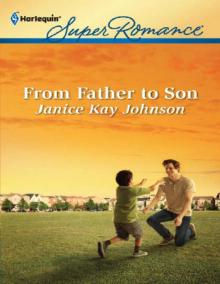 From Father to Son
From Father to Son All the Lost Little Horses (A Desperation Creek Novel Book 2)
All the Lost Little Horses (A Desperation Creek Novel Book 2) Hide the Child
Hide the Child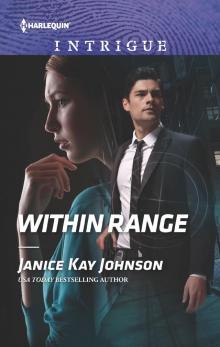 Within Range
Within Range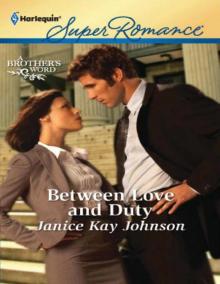 Between Love and Duty
Between Love and Duty First Comes Baby
First Comes Baby Charlotte's Homecoming
Charlotte's Homecoming In A Heartbeat (HQR Superromance)
In A Heartbeat (HQR Superromance)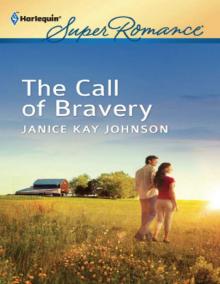 The Call of Bravery
The Call of Bravery In Hope's Shadow
In Hope's Shadow Anything for Her
Anything for Her Harlequin Superromance September 2014 - Bundle 1 of 2: This Good ManPromises Under the Peach TreeHusband by Choice
Harlequin Superromance September 2014 - Bundle 1 of 2: This Good ManPromises Under the Peach TreeHusband by Choice The Baby Agenda
The Baby Agenda More Than Neighbors
More Than Neighbors Her Amish Protectors
Her Amish Protectors All That Remains
All That Remains Whisper of Revenge (A Cape Trouble Novel Book 4)
Whisper of Revenge (A Cape Trouble Novel Book 4)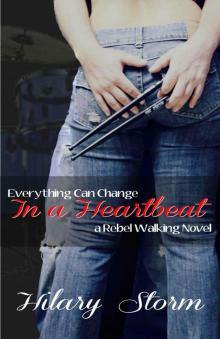 In a Heartbeat
In a Heartbeat A Mother's Claim
A Mother's Claim Because of a Girl
Because of a Girl Back Against the Wall
Back Against the Wall Dangerous Waters
Dangerous Waters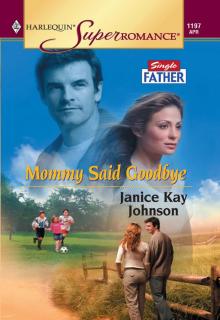 Mommy Said Goodbye
Mommy Said Goodbye A Mother's Secret
A Mother's Secret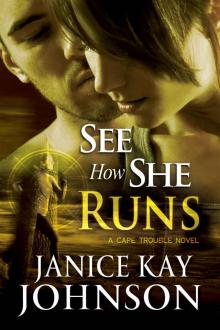 See How She Runs (A Cape Trouble Novel Book 2)
See How She Runs (A Cape Trouble Novel Book 2) Plain Refuge
Plain Refuge Bringing Maddie Home
Bringing Maddie Home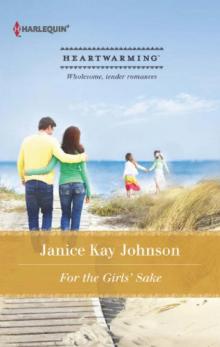 For the Girls' Sake
For the Girls' Sake Through the Sheriff's Eyes
Through the Sheriff's Eyes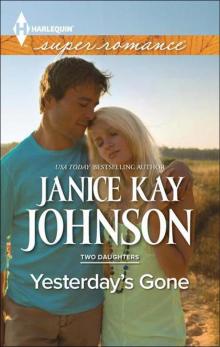 Yesterday's Gone (Two Daughters Book 1)
Yesterday's Gone (Two Daughters Book 1) All a Man Is
All a Man Is Harlequin Superromance January 2014 - Bundle 1 of 2: Everywhere She GoesA Promise for the BabyThat Summer at the Shore
Harlequin Superromance January 2014 - Bundle 1 of 2: Everywhere She GoesA Promise for the BabyThat Summer at the Shore No Matter What
No Matter What Wakefield College 01 - Where It May Lead
Wakefield College 01 - Where It May Lead Someone Like Her
Someone Like Her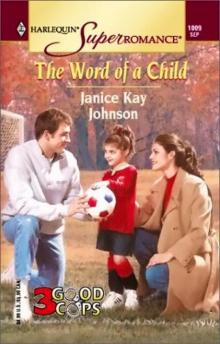 THE WORD OF A CHILD
THE WORD OF A CHILD Harlequin Superromance May 2016 Box Set
Harlequin Superromance May 2016 Box Set Open Secret
Open Secret The New Man
The New Man Finding Her Dad
Finding Her Dad The Perfect Mom
The Perfect Mom All Through The House
All Through The House Match Made in Court
Match Made in Court Making Her Way Home
Making Her Way Home From This Day On
From This Day On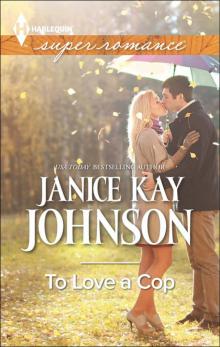 To Love a Cop
To Love a Cop The Hero's Redemption
The Hero's Redemption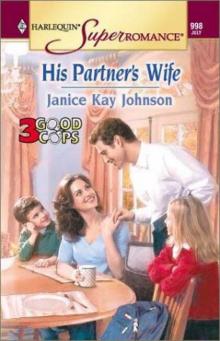 HIS PARTNER'S WIFE
HIS PARTNER'S WIFE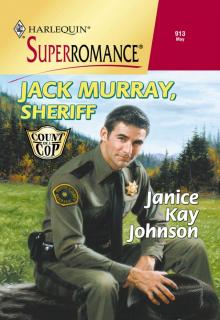 Jack Murray, Sheriff
Jack Murray, Sheriff Dead Wrong
Dead Wrong Twisted Threads (A Cape Trouble Novel Book 3)
Twisted Threads (A Cape Trouble Novel Book 3)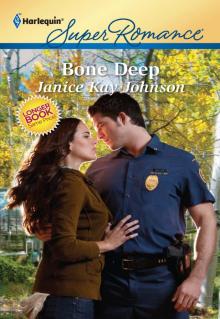 Bone Deep
Bone Deep The Closer He Gets
The Closer He Gets With Child
With Child Whose Baby?
Whose Baby? Kids by Christmas
Kids by Christmas